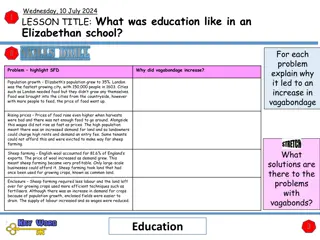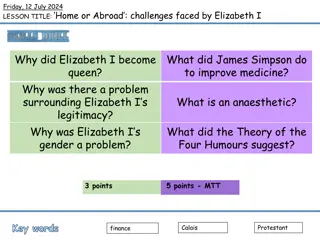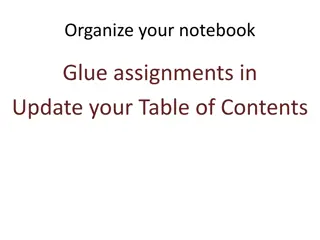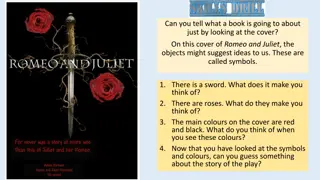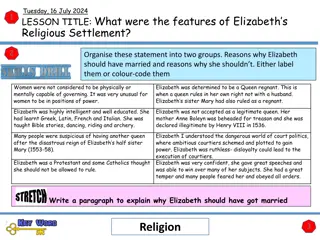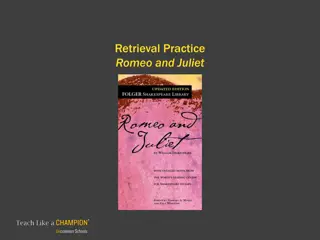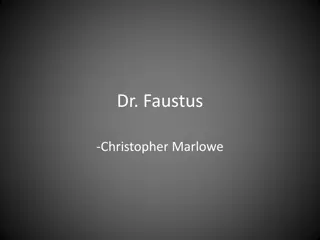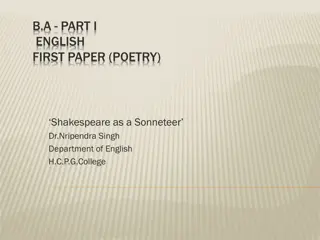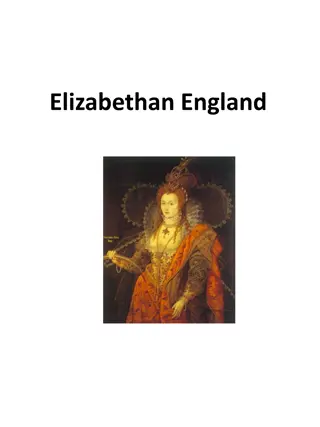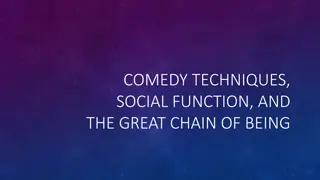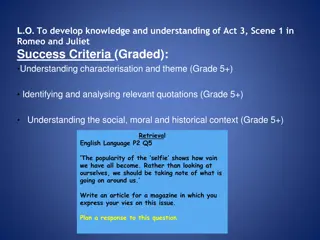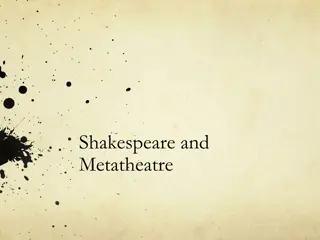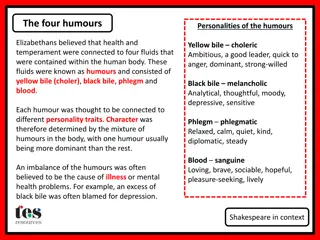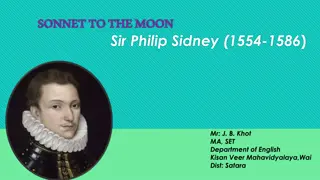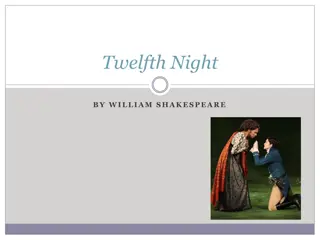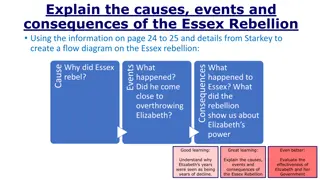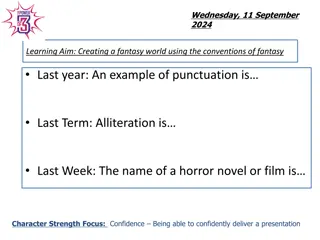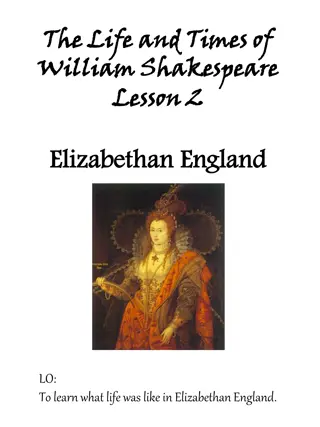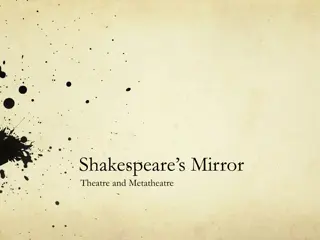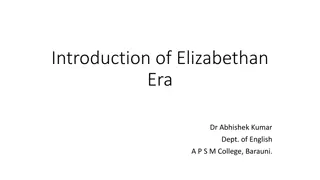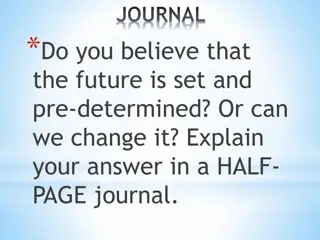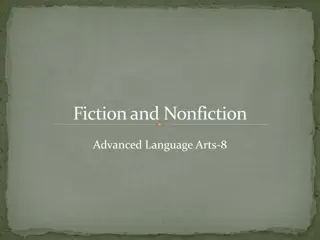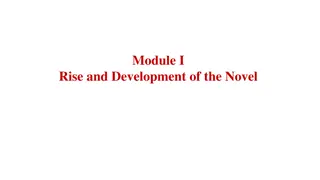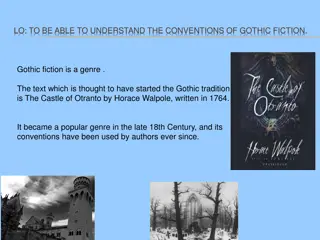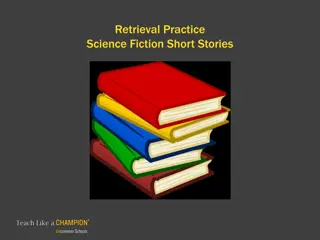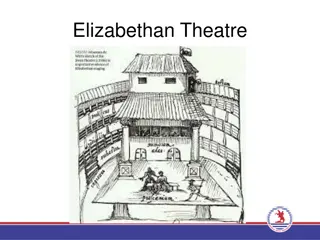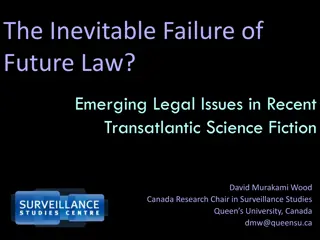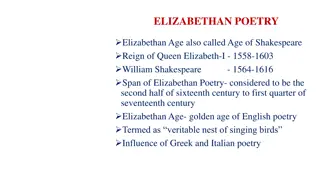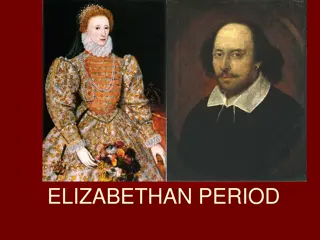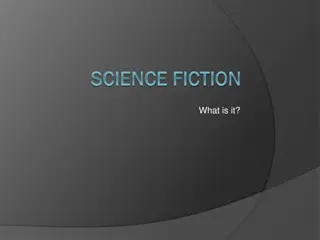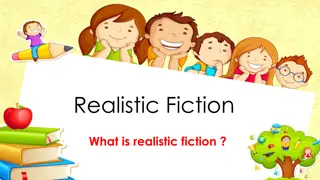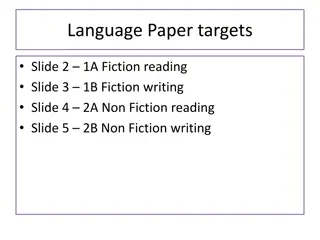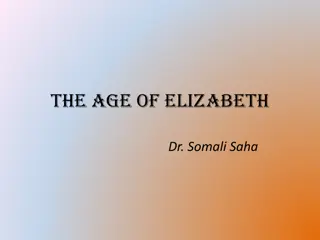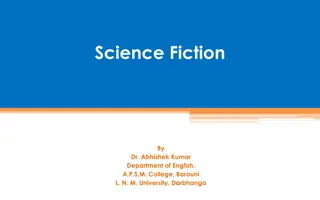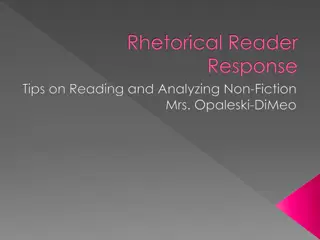Exploring Citizen Journalism and Non-Fiction Writing
Explore the world of citizen journalism and non-fiction writing, learning about text types, adapting writing to conventions, considering audience, purpose, and tone. Discover the significance and usefulness of non-fiction writing, and delve into creating various text types. Uncover the role of citiz
1 views • 11 slides
Education in Elizabethan England: Understanding the Impact on Vagabondage
Explore the educational landscape of Elizabethan England and its effects on societal issues like vagabondage. The content delves into the challenges faced in schools, the reasons behind the increase in vagabondage, and potential solutions to address these issues.
1 views • 7 slides
Challenges Faced by Queen Elizabeth I and Medical Advancements in History
Explore the challenges encountered by Queen Elizabeth I, including issues with legitimacy, gender, and threats from abroad. Learn about the pivotal role of James Simpson in advancing medicine with the introduction of anaesthetics. Discover the intricacies of Elizabethan government and the notable tr
0 views • 11 slides
Exploring Historical Fiction: Elements and Examples
Discover the essence of historical fiction, its key elements, and examples like "Forrest Gump." Learn how plausibility and interpretation play pivotal roles in creating captivating narratives that blend fiction with historical events.
0 views • 11 slides
Symbols and Facts: Uncovering Shakespeare and Elizabethan Theatre
The analysis begins by exploring the symbols present on the cover of "Romeo and Juliet" such as the sword and roses. It then delves into distinguishing facts from opinions regarding Shakespeare's life, touching on key events like his baptism, marriage, and career. Additionally, it provides insights
0 views • 26 slides
Understanding Elizabeth I's Religious Settlement
Explore the key features and impacts of Elizabeth I's Religious Settlement, including reasons for her decision not to marry, challenges faced, and the success of the settlement. Dive into the historical context of Elizabethan England and how religion played a significant role in shaping the era.
0 views • 11 slides
Shakespearean Retrieval Practice for Students
Explore key facts and insights related to Shakespeare and his works through retrieval practice questions and answers. Test your knowledge on topics like Elizabethan England, sonnets, soliloquies, and literary devices used in Romeo and Juliet. Enhance your understanding of Shakespearean literature in
0 views • 20 slides
Elizabethan Religious Settlement: Unity Amidst Division
Amid religious division in England, Queen Elizabeth I implemented a Religious Settlement in 1559 to unify the country. The settlement, a blend of Protestant and Catholic elements, aimed to maintain peace and prevent rebellions. Elizabeth's strategic compromise pleased most people, though lingering t
0 views • 14 slides
The Literary Characters in Christopher Marlowe's "Dr. Faustus
Christopher Marlowe, a prominent Elizabethan playwright, introduced unforgettable characters in his masterpiece "Dr. Faustus." The play revolves around Faustus, a scholar who sells his soul to the devil in exchange for knowledge and power. Mephostophilis, Faustus' manipulative tormentor, and other c
0 views • 25 slides
Shakespeare's Sonnets: Treasures of Elizabethan Poetry
Shakespeare's sonnets, considered precious pearls of Elizabethan poetry, were written primarily in 1594 under the patronage of the Earl of Southampton. Divided into sections addressing a young man and a Dark Lady, they explore themes of love, beauty, and passion with a unique perspective. Despite be
0 views • 8 slides
Life in Elizabethan England: A Glimpse into Stratford
Explore the vibrant streets of Elizabethan towns like Stratford, where markets thrived and malting was a prominent industry. Discover the grid pattern of streets, the devastating fires, and the Bard Tavern's menu offering a taste of the era's culinary delights. Learn about the town's governance by t
0 views • 18 slides
Comedy Techniques, Social Function, and The Great Chain of Being
Explore the world of comedy, from slapstick and farce to parody and satire. Learn about techniques like dramatic irony and gallows humor that add depth to comedic genres. Discover how the Great Chain of Being shaped Elizabethan beliefs about social order and divine right. From God and angels to tree
0 views • 6 slides
Understanding Act 3, Scene 1 in Romeo and Juliet: Themes and Characterization Analysis
Explore the pivotal Act 3, Scene 1 of Romeo and Juliet, delving into character motivations, themes of violence, love, and honor. Analyze key quotations, context, and the impact of the Elizabethan era on character actions and societal norms.
0 views • 18 slides
Shakespeare and Metatheatre: Exploring Elizabethan Theatre Anxiety
Explore the Elizabethan anxiety surrounding the theatre during Shakespeare's time, as highlighted by Philip Stubbes and Sir Philip Sidney. The text delves into concerns about the immoral influence of plays and interludes, portraying a vivid picture of the societal apprehensions towards theater and i
0 views • 38 slides
Beliefs and Influences in Elizabethan Era
Elizabethans believed in the connection between health, temperament, and the four humours - yellow bile, black bile, phlegm, and blood - each associated with specific personality traits. They also linked star signs to body parts and embraced the divine order of the chain of being, respecting the hie
0 views • 6 slides
Sonnet to the Moon by Sir Philip Sidney: A Poetic Ode to Unrequited Love
Born in 1554, Sir Philip Sidney was an Elizabethan courtier, poet, and scholar. "Sonnet to the Moon" from his work "Astrophel and Stella" explores unrequited love through an address to the moon as a sympathetic observer. The poem reflects on the nature of love, beauty, and virtue. With eloquent imag
0 views • 9 slides
Insights into Shakespeare's "Twelfth Night
Explore the origins of Shakespeare's "Twelfth Night" and its characters in Elizabethan comedy. Delve into the historical context of the play, Shakespeare's life, and the universal appeal of his works in Elizabethan England.
0 views • 16 slides
Understanding the Essex Rebellion and Elizabethan Decline
Explore the causes, events, and consequences of the Essex Rebellion and evaluate its impact on Elizabeth and her government, shedding light on why the final years of Elizabeth's reign were viewed as a period of decline. Delve into societal changes, living standards, and cultural advancements during
0 views • 20 slides
Exploring Fantasy Worlds: Conventions, Types, and Challenges
Dive into the realm of fantasy literature and learn about the conventions, types, and differences between fantasy and sci-fi. Uncover the definition of fantasy, explore popular genres, and discover sub-genres like fiction, science fiction, and historical fiction. Engage in thought-provoking challeng
0 views • 17 slides
Washington Irving: Father of American Fiction and Pioneer of American Romanticism
Washington Irving, an influential American author of the early 19th century, is revered as the Father of American fiction. Known for iconic works like "The Legend of Sleepy Hollow" and "Rip Van Winkle," Irving played a crucial role in establishing American literature as an independent art form. His
1 views • 14 slides
Insights into Elizabethan Beliefs in Shakespeare's "Hamlet
Act 1, Scene 1 of "Hamlet" introduces characters and Elizabethan beliefs like ghostly encounters, the power of Latin to exorcise spirits, and the constraints of ghosts. Horatio's skepticism evolves, validating ghostly apparitions for the audience. The scene contrasts superstitions, hierarchy, and ed
0 views • 8 slides
Life in Elizabethan England: Insights from Stratford Upon Avon
Discover the bustling streets of Elizabethan towns like Stratford, market days, and significant events like fires and civic regulations. Explore the daily life and challenges faced by the residents during this historical era.
0 views • 5 slides
Elizabethan Theatre Concerns and Metatheatre Reflections
The Elizabethan era was marked by concerns about the moral influence of theatres. This period saw the establishment of new buildings like The Theatre and The Curtain. Philip Stubbes criticized the theatregoers' behavior, highlighting perceived vices portrayed in plays. Similarly, Sir Philip Sidney d
0 views • 40 slides
Insight into the Elizabethan Era: Queen Elizabeth's Reign
The Elizabethan Era under Queen Elizabeth's reign marked a transformative period in England, characterized by a shift from darkness to light in various aspects of English life. Queen Elizabeth's dedication to England and her inspiring patriotism brought about unity and national greatness, amidst rel
0 views • 9 slides
The Concept of Fate and Free Will in Elizabethan Worldview
The Elizabethan worldview, shaped by the Great Chain of Being, believed in a predetermined order where everything had a fixed place. This belief in divine hierarchy influenced societal structure and interactions, emphasizing responsibilities and consequences. The idea of disrupting this order leadin
0 views • 31 slides
Understanding Fiction and Nonfiction in Language Arts
Fiction and nonfiction are two key genres in literature. Fiction involves imaginative storytelling with elements like plot, characters, setting, point of view, and theme. Nonfiction, on the other hand, deals with real people, events, and ideas, aiming to inform, persuade, or entertain readers. Explo
0 views • 14 slides
Evolution of the Novel: From Medieval Romances to Elizabethan Fiction
The evolution of the novel traces back to the Medieval period with the rise of Anglo-Norman romances and the foundation of English prose. The transition through the 15th and 16th centuries saw the emergence of notable works by authors like Chaucer, Caxton, Sidney, and Milton, shaping the novel into
0 views • 20 slides
Understanding Gothic Fiction Conventions in Literature
Gothic fiction is a captivating genre rooted in dark, mysterious settings, supernatural elements, and eerie atmospheres. Originating with "The Castle of Otranto" by Horace Walpole, this genre has evolved to encompass elements like family curses, isolated castles, and sinister creatures. Dive into th
0 views • 25 slides
Creative Noun Usage in Science Fiction Writing
Explore the art of using nouns to establish genre, setting, and character names in science fiction writing. Learn how authors like Philip Reeve utilize proper nouns to create immersive worlds and unique characters. Delve into the significance of authentic text, discussion, and purposeful learning pr
0 views • 10 slides
Science Fiction Retrieval Practice: Short Stories Insights
Explore futuristic technologies, incongruity, and speculative fiction elements in science fiction short stories like "Robbie" and "There Will Come Soft Rains." Uncover the connections to historical events, like the Cold War, through literary analysis of these captivating narratives.
0 views • 16 slides
Insights into Elizabethan Tragedy and Classical Influence in Drama
Explore the world of Elizabethan theatre, the influence of classic Latin drama, and the evolution of tragedy from the 16th century to modern times. Learn about the elements of tragedy, the shift in tragic heroes from kings to middle-class individuals, and key concepts like hamartia, nemesis, and cat
0 views • 7 slides
Exploring Legal Themes in Science Fiction: The Inevitable Failure of Future Law
This study delves into emerging legal issues in recent transatlantic science fiction works by authors like Charles Stross, Ken McLeod, and Paolo Bacigalupi. It examines the portrayal of law in SF and what insights it offers about our legal systems. Through a systematic survey of over 300 novels and
0 views • 12 slides
Insights into Elizabethan Poetry: A Glance at the Golden Age
The Elizabethan Age, also known as the Age of Shakespeare, during Queen Elizabeth I's reign from 1558 to 1603, marked a golden era in English poetry. This period saw a flourishing of poetic forms influenced by Greek and Italian poetry. Major poets like Edmund Spenser, Sir Philip Sidney, and William
0 views • 6 slides
The Flourishing Elizabethan Period in English Literature
The Elizabethan period, characterized by the reign of Queen Elizabeth I, was a time of significant cultural and literary growth in England. This era saw a robust development of drama and lyric poetry, with notable figures like William Shakespeare making their mark. Amidst political turbulence and re
0 views • 20 slides
Exploring the World of Science Fiction
Science fiction is a genre that delves into imagined future scientific and technological advances, exploring major societal and environmental changes, space travel, time travel, and life on other planets. It combines elements of science and fiction to create believable yet captivating narratives tha
0 views • 14 slides
Understanding Realistic Fiction: Features and Examples
Realistic fiction is a genre of writing that portrays characters, settings, and events that could exist in real life, even though the story itself may be fictional. The key features include believable characters, realistic settings, everyday problems, and plausible solutions. By sorting book covers
0 views • 9 slides
Language Paper Targets for Fiction and Non-Fiction Reading and Writing
This content provides detailed targets for Language Papers, focusing on Fiction and Non-Fiction reading and writing skills. It covers strategies such as being specific in analysis, using evidence from texts, improving sentence structures, enhancing vocabulary usage, and applying language techniques
0 views • 14 slides
The Literary Legacy of Elizabethan Era: Poetry, Drama, and Shakespearean Masterpieces
The Elizabethan Age marked a rich literary period with the emergence of new classicism and romanticism. Notable poets like Spenser, Donne, and Wyatt, along with pre-Shakespearean dramatists, paved the way for the renowned works of William Shakespeare. His poems and plays, ranging from comedies to tr
0 views • 11 slides
Evolution of Science Fiction Literature
Science fiction genre, blending imaginative fantasy with scientific principles, has evolved significantly over time. Initially emerging in the late 1800s, it gained popularity alongside technological advancements. Theodore Sturgeon highlighted the essence of human stories within the genre. Iconic wo
0 views • 8 slides
Effective College Reading and Analysis Strategies for Non-Fiction Texts
Enhance your non-fiction reading and analysis skills with these practical tips: prepare yourself mentally before reading, preview the article, highlight key points while reading, monitor comprehension, and summarize the article afterward. Additionally, learn how to create a rhetorical précis to eff
0 views • 19 slides

